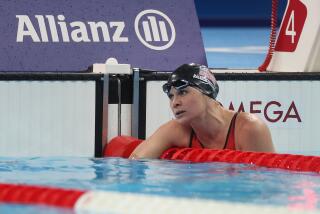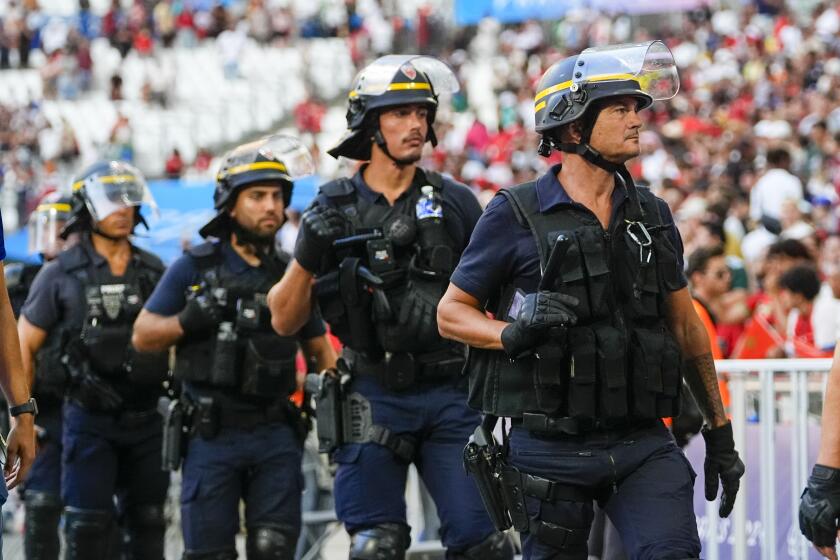Generation Blurs the Lines in China
Yang Yang (A), the short-track speedskating standout who has one of the most intriguing names in sport and is the most celebrated Winter Games figure in modern Chinese history, is perhaps the very emblem of an ascendant Chinese sports program.
Resting in her hotel room here this week, she said there is a time to compete, to show speed and strength, desire and honor.
“I always want to win,” she said.
But, after the race, she added, when the competition is over, there is another time -- a time to show doubters and critics the humanity of China, to illustrate that its athletes ought not be viewed as automatons but as real human beings with passion and feelings too.
“When you go out and meet foreigners, you should smile,” she said in faultless English. “It makes it easier for people to accept you. Once people accept you, it makes everything easier.”
Two years before the Summer Games hit Beijing, the Chinese team here at the 2006 Turin Games is poised for what seems likely to be its best performance at a Winter Olympics. At the same time, observed Li Sheng, a Beijing-based vice president for Visa, “These [Chinese] athletes are very different from the two generations before them.”
He said in a telephone interview, “In the old times, it seemed everything was for the country, sacrifice for the country -- everyone brought up in a state system.”
Now, he said, the team’s “personalities are all different.”
There are Yang Yang (A), he said, with her “elegance” off the ice (four years ago at Salt Lake City, there also was Yang Yang [S], another short-track skater, unrelated to Yang Yang [A]); long-track speedskater Manli Wang, with four earrings in each ear and “attitude” and freestyle skier Li Nina, a budding “superstar ... a rock star” in the making.
The 2006 Games, he said, mark a “great opportunity to put them center stage, not only to showcase their sports excellence but their personalities, their personal stories.... They represent this generation of China ... the whole country as it strives for glory.”
The goal at each edition of the Games, Cui Dalin, an assistant government sports minister and vice president of the Chinese Olympic Committee, said in an interview in November in Beijing, is simple: “Better results. As well as a good spirit of sportsmanship.”
Cui, insisting he was not sandbagging, dismissed the prospect that Chinese athletes could top the medals count in 2008, calling it “impossible.” Though China finished just behind the United States at the 2004 Athens Games in gold medals, 35 to 32, it was well back in the overall count, 102 to 63, and Cui insisted China was not yet strong in many sports.
But, Cui made clear, with a budget of about $100 million annually, roughly comparable to that of the U.S. Olympic Committee’s, China’s Olympic priority is not just taking part -- it’s winning.
In Salt Lake City, the Chinese won eight medals. That eight-count matched the 1998 total from the Nagano Games -- the key difference being that Yang Yang (A) delivered two gold medals in Salt Lake City, China’s first winter golds.
In 1994 in Lillehammer, as in 1992 in Albertville, the Chinese won only three medals. The Albertville medals were China’s first since it entered Winter Games competition in 1980.
In Turin, the Chinese are expected to bring their biggest, deepest, most experienced team.
Yang Yang (S), who won three silvers in her career, is no longer competing. But Yang Yang (A) returns and is again a medal threat.
So is her short-track teammate Wang Meng, a four-time medalist at the 2005 world championships.
On the men’s side, Li Jiajun won two short-track medals in Salt Lake and bronze in the 1,000 meters at last year’s world championships.
Manli Wang is hardly the only medal contender on the long track. So is up-and-comer Wang Beixing, 20.
Pairs figure skaters Shen Xue and Zhao Hongbo won bronze in Salt Lake, gold at the world championships in 2002 and 2003, and silver in 2004. Zhao had an Achilles’ tendon injury and the pair didn’t compete at last year’s world championships. In their stead, Zhang Dan and Zhang Hao won bronze, and Pang Qing and Tong Jian took fourth.
Li Nina, the freestyle skier, fifth in Salt Lake, had a breakout season last year, winning gold at the 2005 world championships. Another freestyle skier, Guo Xinxin, 19th in Salt Lake, won bronze at last year’s championships.
Biathlete Liu Xianying won silver in the women’s 10-kilometer pursuit at the 2005 world championships. Another biathlete, Sun Ribo, is in the hunt for a medal.
“We take it seriously,” Cui said of the Olympics, adding, “We expect more medals.”
Yang Yang (A) said, “Last Games, I was the only one who had a chance for a gold medal. This time, we have long track, figure skating, freestyle, biathlon, maybe more....It’s a big step for winter sports in four years. It’s a big change.”
The (A) after Yang Yang’s name was added early in her career, to differentiate her from Yang Yang (S). The two names are written differently -- (A)’s name translates as “flying flag,” (S)’s as “sunshine.”
The (S) actually stands for “smaller.” Yang Yang (S) is younger -- “smaller” -- than Yang Yang (A) but adding (Y) for “younger” seemed altogether too confusing.
At first, (A) said, the plan was for her to be named (O) for “older” or (L) for “larger,” but she found both demeaning. So, she said, she picked (A), since it’s the first letter of the Western alphabet and because those students who excel in school get A’s -- like her, she said.
Although Yang Yang (S) is no longer competing, Yang Yang (A) said she still favors the (A) after her name because it has become an extension of who she is.
After winning the two golds in Salt Lake City, Yang Yang (A) moved to the United States in 2003 -- first to Salt Lake City, then to San Francisco, living the life of a student. She said she was a year short of a degree in economic management at Tsinghua University in Beijing.
Already she is putting her economic studies to use; she owns four apartments in China, two in Beijing, two in the northern city of Harbin.
In 2004, Yang Yang (A) moved back to Beijing, back into the national training center. Not because she had to -- because she wanted to. She missed team life, and wanted to immerse herself in that experience one last time.
A sophisticated international traveler, it wasn’t as if she didn’t know how to buy milk or eggs at the grocery stores in Salt Lake City and San Francisco.
It’s just, she said, “When I went to the United States, it was the first time I lived without a team. I had friends -- but, still, you have to do everything on your own. Sometimes you feel lonely and helpless. I missed the team a lot.”
As a warmup to the Turin Games, Yang Yang (A) came back for the 2005 campaign. She led a Chinese sweep of the medals in the 500 meters at the world championships.
Here, she probably will skate the 1,000- and 1,500-meter races. She knows, she said, that there is a risk in taking to the ice and coming up short -- because she could have gone out on top, remembered always as the two-time gold medalist from 2002.
But, she said, life is sometimes about taking certain risks. And about the feeling of being alive that comes with testing one’s self at the highest level.
“I have been last. I have won,” she said. “I have learned from both. That’s why I’m here again, I think. Sport is not only about winning and losing. It’s also about your emotions....
“There are not many times in life that you have, that you get to feel your passion, and to feel it so strongly. It’s why I missed sport very much.”
And isn’t that, she asked, at some level the essence of sport, of competing, wherever you’re from, whatever you look like?
She said, “It’s not only about winning. It’s about experiences. It’s more about life.”
More to Read
Go beyond the scoreboard
Get the latest on L.A.'s teams in the daily Sports Report newsletter.
You may occasionally receive promotional content from the Los Angeles Times.





